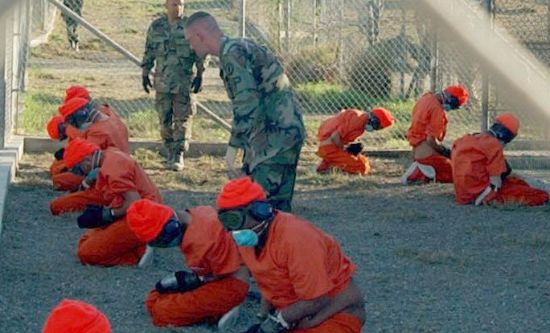
11 January 2022 marked 20 years since the first prisoners arrived at Camp Delta in the illegally occupied US base in Guantanamo Bay, southern Cuba. Over 780 prisoners have endured inhumane treatment in Guantanamo Bay over that time, isolated from the protection of any international convention or treaty. Detainees don’t know their charges or release dates and confession of guilt are regularly obtained through relentless interrogations. Cuba’s current President Miguel Diaz-Canel described the ‘scandalous abuses’ at Guantanamo and defined the US as the ‘biggest violators’ of human rights.
During the 1990s, Guantanamo Bay was used by the US to detain Haitian refugees fleeing a military dictatorship. In a period of six months during 1991, the US imprisoned over 30,000 Haitian refugees in Guantanamo and subjected them to inhuman living conditions in the detention centre. In November 2001 the then-US President Bush passed a military order, authorising the indefinite secret detention of any non-citizens (later extended to citizens). As part of the ‘War on Terror’ the Bush administration targeted detainees on the base of mere ‘suspicion’ of any connection to Al Qaeda or terrorism. These detainees have often not been put on trial nor receive any legal representation. They face military tribunals which use secret evidence, extracted through torture. Those captured in imperialism’s war on Afghanistan or perceived to be in some way affiliated to Al Qaida – or indeed, any Muslim selected at random by US security forces – were branded as ‘unlawful combatants’.
This is a facade to deny any protection to detainees provided by international treaties for the protection of prisoners of war. The Bush administration abandoned the Geneva Convention which prohibited any act ‘by which severe pain or suffering… physical or mental… is inflicted to obtain information’, describing it as ‘quaint’ and archaic. In April 2009 the counsel for President Bush redefined torture as: ‘the intent to inflict suffering equivalent in intensity to the pain accompanying serious physical injury such as organ failure, the impairment of bodily function or even death’.
Changing the definition of torture has permitted the violations of human rights that have taken place in Guantanamo. Horrific accounts of the torture endured in Guantanamo include use of sensory assaults: intense light and sound, rectal feeding, sleep deprivation and more recently ‘waterboarding’ – tying an inmate to a board and submerging them in water until they think they are going to be drowned. Saudi Arabian former-prisoner Abu Zubaydah experienced severe stress after he was forced into a narrow coffin for 11 days as officers pretended to bury him alive. He also recounted 83 stimulated drownings.
FBI agents witnessed ‘strangulations, beatings, placement of lit cigarettes into detainees’ ear openings and unauthorised interrogations. After 20 years of ‘interrogations’ only four prisoners have ever been charged. This insidious suffering is not about information, instead it is assertion of US terror and control.
Britain has acted as a partner in the torture at Guantanamo to preserve its ‘special relationship’ with the US. The case of British resident Binyam Mohamed exemplifies the British government’s participation in the torture. Mohamed was held in Guantanamo without charge for five years between 2004 and 2009. He was routinely tortured. In April 2008, Mohamed’s lawyers asked the British government to give information which would help prove his defence. The government refused, arguing that there was a ‘national security risk’ if information was disclosed, and shamefully declared that Mohamed’s rights would be sufficiently safeguarded by the US legal team.
In 2011 six former detainees sued the British government at the High Court for their detention in Guantanamo. During the case documents exposed Tony Blair’s Labour government as a partner in the US programme of abuse. MI5 and MI6 officers personally took part in interrogations of prisoners at Guantanamo: the British state was fully aware of the torture at the prison camp. The Brighton-based Libyan-born refugee Omar Deghayes was held in Guantanamo without charge between 2002 and 2007. After MI5 interrogated him, an MI5 officer reported to London that Deghayes ‘was also being treated badly, with head-braces and lock-down positions being the order of the day.’ Mohamed took the British government to court in 2010 for the collusion of MI5 and MI6 in his torture during his imprisonment. The Court of Appeal in London ruled in his favour.
US presidents have made several empty promises to shut down Guantanamo. During Barack Obama’s election campaign, he promised to shut down the detention centre and in 2009, on his second full day as president, he issued an order to close it ‘as soon as practical, and no later than one year from the date of this order’. This promise was not fulfilled. Seven years later, when he visited Cuba, Obama failed to mention the closure of Guantanamo, or the suffering endured at the prison camp. Similarly, in Biden’s campaign he also pledged to close Guantanamo, but almost a year into his presidency, not only is he not closing it, but is funnelling an additional $4m dollars into creating a new courtroom, further expanding the $540m operation.
Guantanamo Bay was seized by the US in 1898 during the Spanish-American war. In a deal between the US and its then-puppet Cuban President Estrada, the deep-water bay was granted to the US. The revolutionary Cuban government has demanded the US return the occupied land and close the hellhole prison. It refuses US ‘rent payments’ for the land. We demand an end to the decades of assault and torture at the hands of US and British imperialism on the illegally occupied land in Cuba. End the torture! Close down Guantanamo!
Destinie Sanchez




